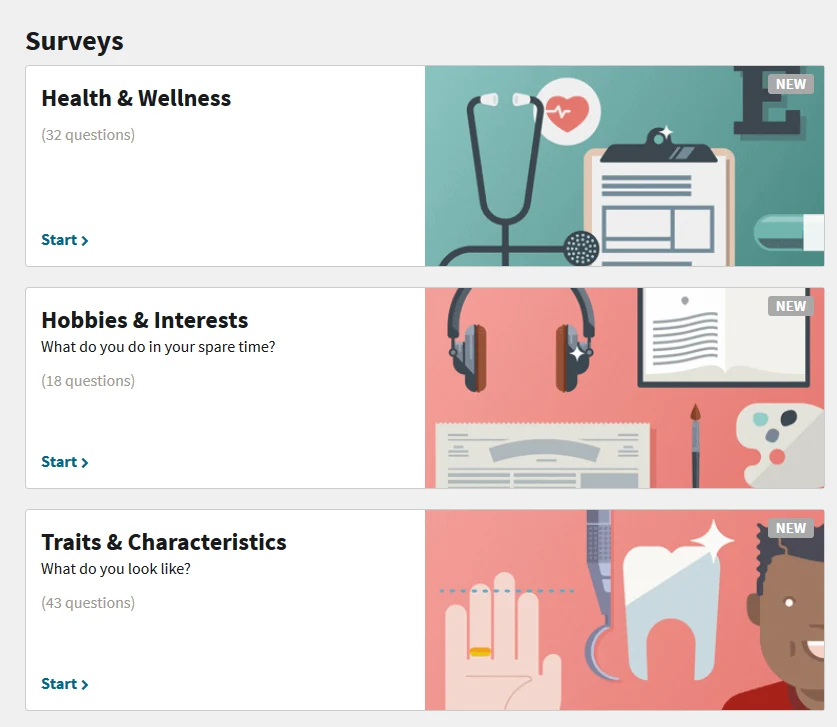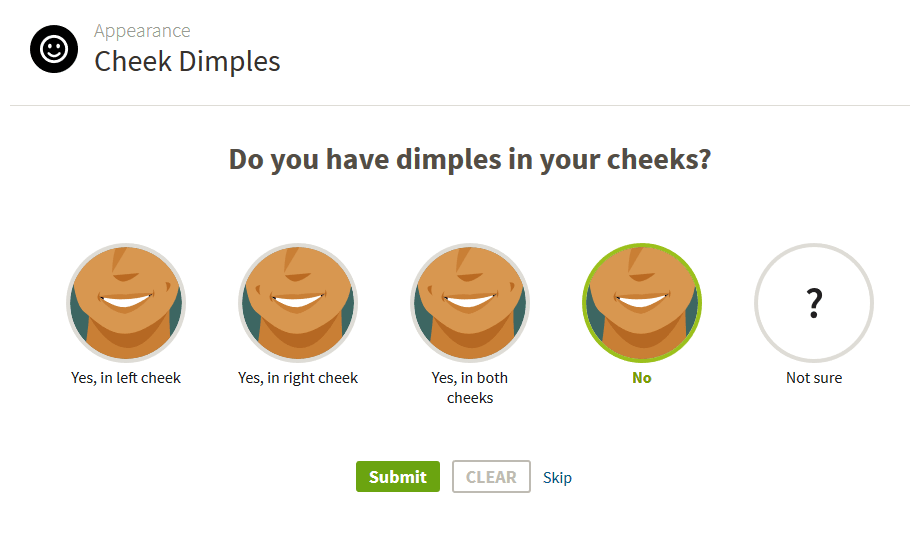Do you see a new feature called "Ancestry Personal Discoveries Project" on your Ancestry DNA results summary page? In this post, you'll learn a little bit about the types of questions they ask in this project and how it might benefit you to answer them.
I first noticed that they had added this feature to my main DNA insights page a few days ago, and I got very excited. It's great when companies innovate and add new features and functionality to their service. Seriously, what's not to love about the work they are doing over there at Ancestry DNA? I've had an amazing experience with my DNA results, finding new family and learning about where my ancestors came from. So naturally, I'm interested to see what else I can learn from my DNA.
How do you access the Ancestry Personal Discoveries Project?
When you first log in to Ancestry DNA, you'll find the familiar DNA Results Summary Page, which was previously known as the DNA Insights Page. Interestingly, it still shows up as "Insights" in your browser, if you check the address of the web page. To check to see if you have the Ancestry Personal Discoveries on your results, scroll down to just below your main results.
It seems like most, if not all, Ancestry DNA customers have this new feature on their account. It's a "Beta" feature, which means that it is currently in testing. In the image below, you can see how it will show up on your results:

In order to access this new feature, you will probably have to consent to an upgraded terms of use agreement. The agreement covers all aspects of your DNA testing, and includes permission to collect information through the use of these questionnaires in order to provide you with additional information contained within your DNA.
What kind of questions do they they ask on the Ancestry Personal Discoveries Project?
The questionnaires on this project cover all sorts of subject areas. They range from what you look like to what you like to do in your spare time. There are questions about your height, your eye color, whether or not your participated in high school sports, and how many languages you speak. There are a few questions that are specific to men, and others that are specific to women.
I decided to do one survey each day, since I didn't know how much time it would take to answer the questions. The questionnaires turned out to have relatively simple questions and I was able to complete them in a very short period. They mention on their page that they may periodically add more questionnaires to their project, so I will make sure to check back every once in a while to see if there are more questions to answer.

Some of the questions made me smile, like the one about dimples. My teenager still has the most adorable dimples - he still hasn't grown out of them. Maybe he won't!

What is the purpose of the Ancestry Personal Discoveries Project?
Of course, I can't on behalf of Ancestry about their Personal Discoveries Project. I don't work for the company and I am not privy to any information that is not available to any other Ancestry customer. With that said, I do happen to know a little bit about some of of the science behind why they might be asking some of these questions.
I'm sure that you know that your DNA is made up of many, many different genes. Some of these genes determine your eye color, and others determine things like whether you have blonde hair or brown (or dimples, like my son). Our genes determine who we are, what we like, and possibly much more than we can ever possibly understand about ourselves. Researchers spend a lot of time trying to figure out which genes determine specific traits, and even whether or not genes can even determine some traits.
Ancestry DNA is in a unique position of having millions of customers who have done DNA testing. This is an excellent source of information, and if many of those people voluntarily answer questions about some of these traits and characteristics, it will likely help researchers answer some of those lingering questions. When I answer questions about the number of languages that I speak, maybe Ancestry will be able to connect a unique aspect of my DNA to the probability of a person with my specific background learning a new language.
While I don't know the specific types of insights that they are planning to share with us, I am super interested to see them.
Should you participate in the Ancestry Personal Discoveries Project?
Whether or not you decide to participate in the research project is completely up to you. I'm glad to participate, but some people are not as comfortable as I am answering personal questions about themselves.
I do hope that enough people participate to help Ancestry DNA provide useful insights to all customers.
It is important to mention that you don't have to answer all of the questions in each questionnaire. If there is a particular question, or series of questions, that you are uncomfortable with, you can simply choose to skip the question.
Ancestry will ask you why you want to skip it, and you can let them know that you feel like it is too personal, or even choose to not provide a reason for skipping the question.
What is certainly true is that the more people who do participate, the more useful and reliable the insights will be, so I do hope you consider it.
Conclusion
I hope that this post helped you get some insight as to what the Ancestry Personal Development Project is all about, and helped you decide whether to participate.
If you have any questions, comments, or concerns about something that you read here, I would love to hear from you in the comments.
Thanks for stopping by!
